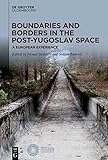Boundaries and Borders in the Post-Yugoslav Space : A European Experience / ed. by Nenad Stefanov, Srdjan Radović.
Material type: TextPublisher: München ; Wien : De Gruyter Oldenbourg, [2021]Copyright date: ©2021Description: 1 online resource (VIII, 275 p.)Content type:
TextPublisher: München ; Wien : De Gruyter Oldenbourg, [2021]Copyright date: ©2021Description: 1 online resource (VIII, 275 p.)Content type: - 9783110712322
- 9783110712827
- 9783110712766
- 320.12094971 23
- DR1316 .B68 2021
- online - DeGruyter
- Issued also in print.
| Item type | Current library | Call number | URL | Status | Notes | Barcode | |
|---|---|---|---|---|---|---|---|
 eBook
eBook
|
Biblioteca "Angelicum" Pont. Univ. S.Tommaso d'Aquino Nuvola online | online - DeGruyter (Browse shelf(Opens below)) | Online access | Not for loan (Accesso limitato) | Accesso per gli utenti autorizzati / Access for authorized users | (dgr)9783110712766 |
Frontmatter -- Acknowledgements -- Contents -- (Ex) Yugoslav and (South-East) European -- B/ordering the (post-) Yugoslav space: A European experience -- “Faded scratches in marble”: Federal b/ordering of socialist Yugoslavia -- Human rights: A b/ordering narrative in Central and Eastern Europe -- Making and mapping borders -- Borders as reused objects: The case of Slovenia -- Boundary stones: Standing witnesses of World War II borders in present-day Slovenia -- Mapping the uncertain: Difficulties with establishing the ethnic borders in interwar Yugoslavia -- Mapping ethno-politics: Borders and cartographic representation in post-Yugoslav (virtual) space -- Living and overcoming borders -- Production of territoriality in the Balkans: The border and the Monastery St. Naum -- Imagining the borders of a nation: Narratives of remembrance in the Northern Adriatic area -- Reshaping the borders of Bosnia and Herzegovina, from the Yugoslav Wars to the European integration -- Writing and sensing borders -- On word boundaries and blank spaces: Perceptions of orthography and writing reforms in the post-Serbo-Croatian language sphere -- Food, borders, and interactions in South-East Europe (1830s–1870s) -- Crossing culinary borders, blurring social boundaries: Balkan Grills in West Berlin -- Notes on contributors -- Index
restricted access online access with authorization star
http://purl.org/coar/access_right/c_16ec
The disintegration of Yugoslavia, accompanied by the emergence of new borders, is paradigmatically highlighting the relevance of borders in processes of societal change, crisis and conflict. This is even more the case, if we consider the violent practices that evolved out of populist discourse of ethnically homogenous bounded space in this process that happened in the wars in Yugoslavia in the 1990ies. Exploring the boundaries of Yugoslavia is not just relevant in the context of Balkan area studies, but the sketched phenomena acquire much wider importance, and can be helpful in order to better understand the dynamics of b/ordering societal space, that are so characteristic for our present situation.
Issued also in print.
Mode of access: Internet via World Wide Web.
In English.
Description based on online resource; title from PDF title page (publisher's Web site, viewed 01. Dez 2022)


